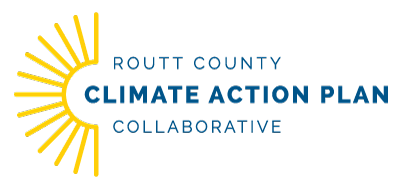History of the Collaborative.
Routt County, the City of Steamboat Springs and the Towns of Hayden, Oak Creek and Yampa recognize the only way to address climate action is to work together proactively on tangible, greenhouse emission reduction solutions.
Building from Routt County’s past efforts, the community agreed to implement an actionable, emissions reduction plan targeted in the areas of Economy, Energy, Land Use, Transportation and Waste. The timeline below highlights the steps taken to get us to the Climate Action Plan we have today and the Collaborative team pushing this important work forward.
To quantify greenhouse gas (GHG) emissions within Routt County and the City of Steamboat Springs, Lotus Engineering and Sustainability, LLC was contracted to create a 2005 and 2018 GHG inventory. In 2018, Routt County emissions totaled 693,367 metric tons of carbon dioxide. The purpose of these GHG emissions inventories was to create a clear picture of past and current GHG emission sources, understand trends, and establish a baseline for future emissions inventories that will guide climate action planning. The study served as a catalyst for the formation of the Climate Action Plan.

2021
Routt County Climate Action Plan (CAP) Completed
The Climate Action Plan (CAP) identifies 22 attainable strategies that reduce carbon emissions across Energy, Transportation, Waste, Land Use and Economy. If all 22 strategies and associated actions are implemented successfully, Routt County could reduce carbon emissions by 35% by 2030 and 74% by 2050, as compared to the 2018 emissions baseline.
2021
Routt County Climate Action Plan Collaborative Created
Routt County, the City of Steamboat Springs and the Towns of Hayden, Oak Creek and Yampa agreed to work together and adopted the Climate Action Plan. All partners signed an Intergovernmental Agreement (IGA) to develop the CAP Collaborative — an organizational structure to facilitate regional decision-making and align climate action work.
The Board currently consists of 9 members, including 4 community members and a representative from each of the local government partners. Through regular monthly meetings, the Board offers substantive expertise and critical stakeholder perspectives to its oversight role, representing the entire geographic scope of the project area to assure consistency, coordination and integration across the County.
2022
YVSC Selected as PME
Yampa Valley Sustainability Council (YVSC) selected as the Program Management Entity (PME) for the Collaborative Board and Working Groups. YVSC provides administrative and programmatic support, and carries out communication activities for the Collaborative Board.
Working Groups made up of 10-15 Board-approved technical experts convened monthly to identify actionable, high impact recommendations needed to meet CAP carbon reduction goals and strategies across five CAP sectors. Groups inventoried current efforts and identified gaps and priority projects and policies that reduce GHG emissions as they relate to the Energy, Transportation, Waste, Land Use and Economy.
2023
Working Groups Prioritize High Impact Recommendations
Working Groups used five Board approved criteria to prioritize 10-12 actionable draft recommendations (policy and on-the-ground projects) implementable within a 5-year time period. All CAP Working Groups met at the end of April to peer review recommendations. Revised recommendations were brought to the CAP Board at the end of May for review before public comment.
2023
Public Open House and Recommendations Finalized
Public open house held June 21 to share 41 draft recommendations for public comment and input. Close to 200 people attended (!) and 90 public comments received and integrated into formal recommendations. Updated recommendations were brought to the CAP Board at the end of July for final review.
2024
CAP Implementation
Working Groups meet quarterly to support progress of and to provide updates on CAP Recommendation Progress Tracker. CAP Board continues to meet monthly to fulfill the accountability role of the CAP (e.g., funding, education and partner engagement). CAP governments to support implementation of CAP recommendations actions.
2025
2023 Routt County Greenhouse Gas Emission Inventory Completed
The Routt County 2023 Greenhouse Gas Emissions Inventory tracks how greenhouse gas emissions have changed since the last greenhouse gas (GHG) inventory was performed in 2018. The inventory was performed in accordance with the Routt County Climate Action Plan accountability recommendation to update the inventory every five years in order to track progress and revise benchmarks as needed. The results of the inventory show an overall 6% decrease in emissions, decreasing to 669,794 metric tons in 2023 from approximately 713,392 metric tons in 2018.


